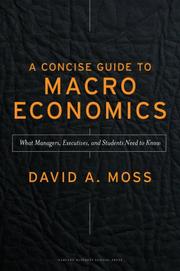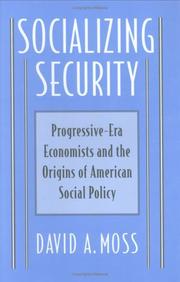| Listing 1 - 10 of 11 | << page >> |
Sort by
|
Book
ISBN: 0674237706 9780674237704 Year: 2017 Publisher: Cambridge (Mass.): Belknap press of Harvard university press,
Abstract | Keywords | Export | Availability | Bookmark
 Loading...
Loading...Choose an application
- Reference Manager
- EndNote
- RefWorks (Direct export to RefWorks)
To all who say our democracy is broken--riven by partisanship, undermined by extremism, corrupted by wealth--history offers hope. Democracy's nineteen cases, honed in David Moss's popular course at Harvard and taught at the Library of Congress, in state capitols, and at hundreds of high schools across the country, take us from Alexander Hamilton's debates in the run up to the Constitutional Convention to Citizens United. Each one presents a pivotal moment in U.S. history and raises questions facing key decision makers at the time: Should the delegates support Madison's proposal for a congressional veto over state laws? Should President Lincoln resupply Fort Sumter? Should Florida lawmakers approve or reject the Equal Rights Amendment? Should corporations have a right to free speech? Moss invites us to engage in the passionate debates that are crucial to a health society. --
Democracy --- Social conflict --- United States

ISBN: 9781422101797 Year: 2007 Publisher: Boston, Mass. Harvard Business School Press
Abstract | Keywords | Export | Availability | Bookmark
 Loading...
Loading...Choose an application
- Reference Manager
- EndNote
- RefWorks (Direct export to RefWorks)

ISBN: 0674007573 Year: 2002 Publisher: Cambridge (Mass.) Harvard university press
Abstract | Keywords | Export | Availability | Bookmark
 Loading...
Loading...Choose an application
- Reference Manager
- EndNote
- RefWorks (Direct export to RefWorks)
Disaster relief --- Government insurance --- Risk management --- Risk management --- Government policy

ISBN: 0674815025 Year: 1996 Publisher: Cambridge, Mass. ; London Harvard University Press
Abstract | Keywords | Export | Availability | Bookmark
 Loading...
Loading...Choose an application
- Reference Manager
- EndNote
- RefWorks (Direct export to RefWorks)
Book
ISBN: 9780674275423 Year: 2004 Publisher: Cambridge, MA
Abstract | Keywords | Export | Availability | Bookmark
 Loading...
Loading...Choose an application
- Reference Manager
- EndNote
- RefWorks (Direct export to RefWorks)
Book
ISBN: 9780674974081 Year: 2017 Publisher: Cambridge, MA
Abstract | Keywords | Export | Availability | Bookmark
 Loading...
Loading...Choose an application
- Reference Manager
- EndNote
- RefWorks (Direct export to RefWorks)
Book
ISBN: 9781107036086 9781107646704 9781139565875 Year: 2014 Publisher: New York, N.Y. Cambridge University Press
Abstract | Keywords | Export | Availability | Bookmark
 Loading...
Loading...Choose an application
- Reference Manager
- EndNote
- RefWorks (Direct export to RefWorks)
Sociology of law --- United States --- United States of America
Book
ISBN: 9780521118484 0521118484 9786612466984 9780511657887 9780511657504 9780521280532 1107203392 0511700482 0521280532 1282466984 0511657889 0511658435 0511656572 051165572X 0511657129 9780511658433 9780511656576 0511657501 9780511655722 Year: 2010 Publisher: Cambridge New York Cambridge University Press
Abstract | Keywords | Export | Availability | Bookmark
 Loading...
Loading...Choose an application
- Reference Manager
- EndNote
- RefWorks (Direct export to RefWorks)
"After two generations of emphasis on governmental inefficiency and the need for deregulation, we now see growing interest in the possibility of constructive governance, alongside public calls for new, smarter regulation. Yet there is a real danger that regulatory reforms will be rooted in outdated ideas. As the financial crisis has shown, neither traditional market failure models nor public choice theory, by themselves, sufficiently inform or explain our current regulatory challenges. Regulatory studies, long neglected in an atmosphere focused on deregulatory work, is in critical need of new models and theories that can guide effective policy-making"--Provided by publisher.
Trade regulation. --- Industrial policy. --- AA / International- internationaal --- 321.2 --- 331.33 --- 333.139.2 --- Economisch beleid van de overheid. --- Structureel beleid. Reglementering. Dereglementering. Ordnungspolitik. --- Bankcontrole en -reglementering. Reglementering van het bankberoep. --- Trade regulation --- Industrial policy --- -381.301 --- Business --- Industries --- Industry and state --- Economic policy --- Regulation of trade --- Regulatory reform --- Commercial law --- Consumer protection --- Deregulation --- Electronic information resources. --- Electronic information resources --- Government policy --- Law and legislation --- E-books --- Economisch beleid van de overheid --- Structureel beleid. Reglementering. Dereglementering. Ordnungspolitik --- Bankcontrole en -reglementering. Reglementering van het bankberoep --- Business, Economy and Management --- Economics --- Regulation
Book
ISBN: 1107496896 1107502438 1139565877 1107036089 1107646707 Year: 2014 Publisher: Cambridge : Cambridge University Press,
Abstract | Keywords | Export | Availability | Bookmark
 Loading...
Loading...Choose an application
- Reference Manager
- EndNote
- RefWorks (Direct export to RefWorks)
When regulations (or lack thereof) seem to detract from the common good, critics often point to regulatory capture as a culprit. In some academic and policy circles it seems to have assumed the status of an immutable law. Yet for all the ink spilled describing and decrying capture, the concept remains difficult to nail down in practice. Is capture truly as powerful and unpreventable as the informed consensus seems to suggest? This edited volume brings together seventeen scholars from across the social sciences to address this question. Their work shows that capture is often misdiagnosed and may in fact be preventable and manageable. Focusing on the goal of prevention, the volume advances a more rigorous and empirical standard for diagnosing and measuring capture, paving the way for new lines of academic inquiry and more precise and nuanced reform.
Book
ISBN: 9780197760789 0197760783 9780197760796 0197760791 Year: 2024 Publisher: New York, NY: Oxford University Press,
Abstract | Keywords | Export | Availability | Bookmark
 Loading...
Loading...Choose an application
- Reference Manager
- EndNote
- RefWorks (Direct export to RefWorks)
"Democracy is often described in two opposite ways, as either wonderfully resilient or dangerously fragile. Curiously, both characterizations can be correct, depending on the context. In a relatively small number of countries, democracy has survived numerous shocks across many generations, while in others it has faltered or collapsed, whether after just a short time or a long period of apparent strength. Some broken democracies have reconstituted themselves as democracies once again, while others have notably failed to do so"--
Democracy --- Social conflict --- World politics --- Democratization
| Listing 1 - 10 of 11 | << page >> |
Sort by
|

 Search
Search Feedback
Feedback About UniCat
About UniCat  Help
Help News
News